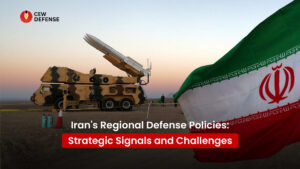Turkey’s defense industry has rapidly transformed into a global powerhouse, marked by record-breaking export growth, latest military technology, and expanding international partnerships. As Turkey solidifies its position among the top 10 defense exporters worldwide in 2025, its active role in global defense forums highlights both its strategic ambitions and technological advancements.
This article provides a comprehensive overview of Turkey’s defense industry growth, key innovations like the Bayraktar TB2 drone and KAAN fighter jet, export achievements, challenges, and future outlook.
The Evolution of Turkey’s Defense Industry and Military Technology
Turkey’s defense sector journey began with heavy reliance on foreign imports but has shifted dramatically toward self-reliance and indigenous innovation. Since the 1980s, Turkey has invested heavily in defense R&D, nurturing companies like ASELSAN, Baykar, Roketsan, and Turkish Aerospace Industries (TAI).
- Indigenous R&D: Turkey now invests nearly $3 billion annually in defense research, focusing on UAVs, missile systems, naval vessels, and fighter jets.
- Technological Milestones: The Bayraktar TB2 drone revolutionized unmanned aerial warfare and became a top export product. The KAAN fifth-generation fighter jet had its maiden flight in 2024, with export orders from Indonesia signaling Turkey’s growing aerospace capabilities.
- Industry Growth: Over 3,500 companies operate in the sector, generating $16 billion in annual revenue and employing 150,000 people.
Turkey’s Defense Exports in 2025: A Record-Breaking Year
As per the report, Turkey’s defense exports reached $7.15 billion in 2024, a 29% increase over the previous year, and are projected to exceed $10 billion by 2026. The country now exports defense products to over 185 countries, including key markets in Europe, Asia, Africa, and the Americas.
- Top Export Products: UAVs like Bayraktar TB2 and Akıncı drones, armored vehicles such as the Kirpi II and Altay tank, naval platforms including MILGEM corvettes, and missile systems.
- Strategic Partnerships: Collaborations with Indonesia, Finland, Brazil, and Gulf states have expanded technology sharing and co-production agreements.
- NATO Relations: Turkey’s defense industry plays a growing role within NATO frameworks, despite some geopolitical tensions.
Innovation and R&D: Driving Turkey’s Defense Industry Forward
Turkey’s commitment to innovation is evident in its focus on integrating artificial intelligence, quantum computing, and indigenous engine development into military platforms.
- AI & Quantum Computing: Turkey launched its first domestic quantum computer in 2024, enhancing secure communications and advanced defense capabilities.
- Next-Gen Platforms: The KAAN fighter jet and TF-2000 air defense destroyer represent leaps in indigenous aerospace and naval technology.
- Leading Companies: ASELSAN, Baykar, Roketsan, and TAI lead the charge in developing and exporting advanced military technologies.
Turkey’s Presence in Global Defense Forums
Turkey actively participates in international defense exhibitions such as IDEF and collaborates with global defense industries to showcase its capabilities. These forums facilitate contract negotiations, technology partnerships, and strengthen Turkey’s role in NATO and regional security initiatives.
Turkey’s growing presence in forums like IDEF and NATO collaborations parallels broader strategic developments across Asia, including China’s expanding influence in South Asia, highlighting the interconnected nature of global defense shifts.
Challenges Facing Turkey’s Defense Industry
Despite impressive growth, Turkey faces several challenges:
- Geopolitical Risks: Procurement of systems like the Russian S-400 missile has strained relations with some NATO allies.
- Technology Dependencies: Some high-tech components remain imported, posing risks to full autonomy.
- Market Competition: Established Western and Asian defense exporters remain strong competitors.
- Institutional Complexities: Civil-military relations and long-term strategic planning require careful management.
Looking Ahead: Opportunities and Strategic Outlook
Turkey aims to become a top 10 global defense exporter by 2026 by:
- Expanding export markets further into Europe, the Middle East, Africa, and Asia.
- Increasing indigenous production and R&D investment.
- Strengthening international partnerships and joint ventures.
- Leveraging battlefield-proven technologies like Bayraktar drones to attract new customers.
With its growing technological prowess and strategic diplomacy, Turkey’s defense industry is set to play a pivotal role in shaping global defense trends.
Quick Facts Table: Turkish Defense Industry in 2025
Metric | 2025 Value | Global Rank/Note |
Defense Exports | $7.15 billion | 11th largest globally |
Industry Revenue | $16 billion | Top 10 globally |
Annual R&D Spending | ~$3 billion | Leading in region |
Number of Defense Companies | 3,500+ | – |
Export Destinations | 185 countries | – |
Military Strength Ranking | 9th globally | Top 10 |
Leading Defense Companies | ASELSAN, Baykar, TAI | Global Top 100 |
Notable Export Products | UAVs, tanks, ships | High global demand |
Major Strategic Partnerships | Indonesia, Finland, Brazil | NATO and global alliances |
Conclusion
Turkey’s defense industry in 2025 exemplifies a successful blend of innovation, export growth, and strategic international engagement. With advanced military technologies like the Bayraktar TB2 drone and KAAN fighter jet, expanding export markets, and strong R&D investment, Turkey is poised to strengthen its global defense footprint further.
While geopolitical and technological challenges remain, Turkey’s balanced approach to growth and diplomacy positions it as a key player in the evolving global defense landscape.
Stay updated with more strategic insights from CEW Defense. Follow us or explore related articles below






